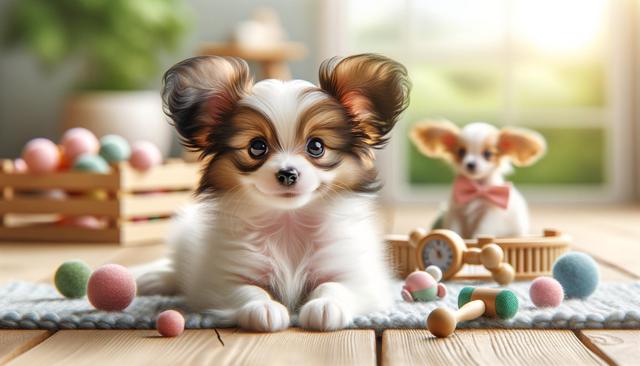Origins and Unique Characteristics
The Papillon breed, whose name means ‘butterfly’ in French, is aptly named for its distinctive ear shape resembling butterfly wings. These small dogs have a rich history dating back to Renaissance Europe, where they were frequently depicted in paintings alongside royalty and aristocrats. Despite their petite size, Papillon puppies exhibit an alert and confident demeanor, often acting as if they are much larger than they appear.
The breed is known for its fine-boned structure, feathered tail, and expressive eyes. Papillon puppies typically weigh between 4 to 9 pounds when fully grown and stand about 8 to 11 inches tall. Their coat is long, silky, and usually white with patches of color, most commonly in shades of brown, black, or red. The hallmark of the breed, however, lies in the ears—either erect (Papillon) or dropped (Phalène), both equally accepted within breed standards.
Temperament and Behavior
Papillon puppies are known for their vivacious temperament and high intelligence. They thrive on interaction and are quick learners, which makes them particularly responsive to training. Their inquisitive nature often leads them to explore their environment thoroughly, and they are not shy about approaching new people or animals. This trait makes them excellent companions for social households.
These dogs tend to form strong attachments to their human family members. While they are friendly, they may display a protective streak, especially around strangers. Their alertness also makes them effective watchdogs—despite their small size, they will not hesitate to bark to alert their owners of unusual activity. Some common personality traits include:
- Playfulness and enthusiasm
- Affectionate with family members
- Alert and responsive
- Highly trainable and intelligent
Training and Mental Stimulation
Training a Papillon puppy is usually a rewarding experience due to their sharp minds and eagerness to please. These puppies respond well to positive reinforcement techniques such as treats, praise, and play. Early socialization and obedience training are recommended to ensure they develop into well-rounded adult dogs.
Because they are so intelligent, Papillons require more than just physical activity; mental stimulation is equally important. Puzzle toys, obedience games, and agility training are excellent ways to keep them engaged. Without sufficient mental and physical stimulation, they can become bored and develop undesirable habits such as excessive barking or destructive behavior.
Recommended training tips include:
- Start socialization early with people and other pets
- Use short but consistent training sessions
- Rotate toys to keep their interest levels high
- Consider enrolling in dog sports or agility classes
Grooming and General Care
Despite their long, silky coats, Papillon puppies are relatively low-maintenance when it comes to grooming. Their fur does not mat easily, but regular brushing—about two to three times a week—helps keep it clean and tangle-free. Unlike some other breeds, they have minimal shedding and no undercoat, making grooming more straightforward.
Routine care should also include:
- Regular ear cleaning to prevent infections, especially due to their prominent ears
- Brushing their teeth several times a week to maintain oral health
- Trimming their nails monthly to prevent overgrowth
- Bathing only as needed, usually every few weeks
Veterinary check-ups, a balanced diet, and regular exercise all contribute to the overall well-being of a Papillon. These dogs typically enjoy a long lifespan, often 12 to 16 years, especially when provided with proper preventive care.
Ideal Living Environment
Papillon puppies adapt well to a variety of living situations, including apartments, suburban homes, or rural areas. Their small size makes them suitable for indoor living, but they still need daily exercise and outdoor time to stay healthy and mentally satisfied. Whether it’s a walk in the park or a play session in the yard, physical activity is a must.
They are especially well-suited for:
- Individuals or families who can provide ample attention
- Homes with older children who understand how to interact with small dogs
- Owners interested in dog sports or advanced training
- People looking for a loyal and intelligent companion
While Papillons can adjust to a range of environments, they do best in households where they are not left alone for extended periods. Their need for companionship and stimulation means they flourish in interactive and engaging homes.
Conclusion
Papillon puppies bring a unique blend of charm, intelligence, and liveliness into any home. Their manageable size, graceful appearance, and dynamic personality make them an excellent choice for dog lovers who can match their energy and attention needs. With the right care, training, and companionship, a Papillon can grow into a loyal and joyful family member for years to come.




Leave a Reply